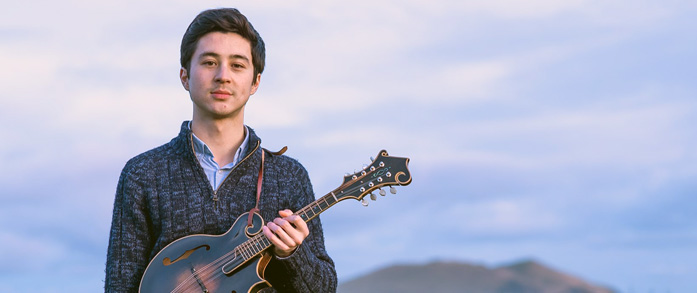Scottish mandolinist Callum Morton, known throughout the UK for his work with Glasgow’s The Fountaineers, has embarked on a solo project of his own music. Its first single drops today, Oban Bay, where the Scots make some of the finest whiskey in the world.
A very talented young musician, Callum had the opportunity to study mandolin both at the Royal Conservatory of Scotland, and at East Tennessee State University.
He explained how that all came about…
“Before I auditioned to college, I was classically trained as violinist. I was very much on the classical mandolin train, playing Bach and Bartok, and was accepted to The Royal Conservatoire of Scotland as a classical mandolinist, though I quickly moved to Scottish Traditional music in year two. There wasn’t really a course for bluegrass mandolin, though I was always grateful to be given the space to practice and explore all sorts of mandolin styles.
Another benefit of RCS was access to top notch teachers. Barbara Pommerenke-Steel for classical, Laura-Beth Salter (mandolinist with Kinnaris Quintet), and later on, Innes White (Siobhan Miller Band) all taught me different aspects of musicianship which have seeped into my playing.
For me, as a budding bluegrass enthusiast, the top benefit was access to the exchange course, the Erasmus+ exchange: a three month long (one semester) trip to East Tennessee State University (ETSU) that truly was life-changing. I was lucky enough to take lessons with Adam Steffey whilst there. His passion for mandolin playing, along with his mastery of the style, set me on the course I’m on today.
ETSU is revered here in the UK for producing the finest young bluegrass stars. My brief stint there only cemented this belief. Folks like Tray Wellington, Thomas Cassel, Alex Genova, and Aynsley Porchak were all coming up at the time. It was incredible to be around top-notch pickers all day. I would often be too intimidated to jump into jams there, but I found my footing in the Celtic Pride band, led by Will MacMorran. I gained valuable insight into the gigging, recording, and promoting process that I lean on to this day.”
For Oban Bay, Morton is supported by Pepita Emmerichs on fiddle and twin mandolin, Theodore Barnard on guitar, Calum McKinlay on banjo, and Ewan Hastie on bass. He says that he was deeply influenced by some of the best in writing the tune.
“The tune is loosely inspired by an early Punch Brothers (How to Grow a Woman from the Ground) recording of Paul Shelasky’s tune, Cazadero, and is also influenced by Béla Fleck’s recent tune, Boulderdash, from his newest record, My Bluegrass Heart. The tune is named after a small town in the west coast of Scotland. I spent a weekend there with my partner and enjoyed the excellent whisky, and phenomenal view out of the bay towards the tiny Scottish lower Hebridean island of Kerrera.”
Have a listen…
Callum is both promoting and funding his solo album using Kickstarter, where anyone so inclined can lend support to an accomplished young artist dedicated to bluegrass, old time, and traditional music.
“The campaign runs for 30 days (ending August 18) and works on an all or nothing funding model, meaning that if we don’t make the initial target, everything will be refunded and sadly, the album cannot be made. Fortunately, I’ve curated tiers for backers that unlock rewards such as tune-books, posters, and personalised transcriptions. I’ve even created a special tier exclusive to US backers featuring my very own travel and whisky recommendations amongst other things.
As of today (July 26), we are over 50% funded, and it keeps going! If we hit the initial target there are stretch rewards that upgrade most tiers at no extra cost, so you’ll want to encourage your friends and family to pledge to get the most out of your chosen tier. Telling someone who may be interested goes a long way too! Whatever works for you. You’ll have my undying gratitude either way, and you’ll be helping to support new music. If successful, the album will be recorded in early September with a release date tentatively set for December 2023. After which, with a bit of luck all that’s left to do is bring the music to your local venue!”
We asked whether Morton would start his own touring group, or stay with The Fountaineers.
“Yes, I will continue to do both. The Fountaineers zero-in on traditional bluegrass and I feel that helps keep me grounded. Earlier this year, the group became the first official bluegrass band on the roster of Live Music Now Scotland, a long running organization founded by Yehudi Menuhin, that brings concerts to outreach venues in Scotland such as hospitals, schools and care homes. It’s a true honour to be part of it and share Bluegrass music with so many folks.
We just returned home from a weekend in England at Naseby Battlefield Bluegrass festival, and are working up towards Moniaive Bluegrass Festival in September. I have also been floating the idea of a strictly Tony Rice full album performance. The band seem keen, I just have to find a venue. The Fountaineers show no sign of stopping, thankfully, so I have lots to look forward to!”
Oban Bay is available now from popular download and streaming services online.
You can support Callum Morton and his debut recording at Kickstarter where you can pre-order the album by pledging the cost of the purchase to his campaign.
